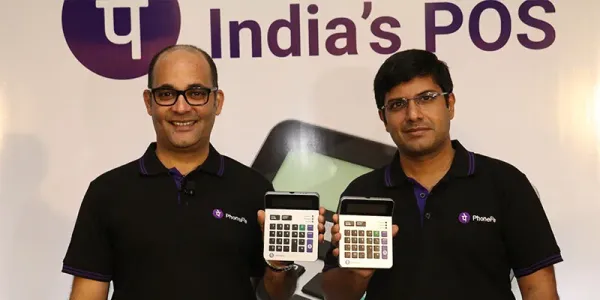
Co-founders Sameer Nigam and Rahul Chari of PhonePe, the top digital payments company in India, received a substantial wage decrease in FY24. Their pay and benefits decreased, but the company’s earnings, market share, and profitability all increased significantly. This change highlights PhonePe’s changing financial situation as it maintains its hegemony in the Unified Payments Interface (UPI) market. Let’s examine the pay adjustments, their justifications, and the business’s FY24 performance in more detail.
Credits: Money Control
The annual report released by PhonePe on October 21, 2024, revealed that Nigam and Chari’s salaries dropped to Rs 5 crore each in FY24, down from Rs 7 crore in the previous year. This figure includes their salaries and benefits, though gratuity is excluded. However, this base salary is only a small portion of their total compensation package.
The largest drop was seen in the value of share-based payments, or Employee Stock Ownership Plan (ESOP). In FY24, the founders received ESOPs worth Rs 226 crore—an enormous reduction from the Rs 917 crore they took home in FY23, representing a 75% decline. This reduction isn’t linked to a decrease in shares allotted but is mostly due to PhonePe’s massive jump in valuation from $5 billion to $12 billion in FY23, which boosted the founders’ share-based earnings during that financial year.

Credits: Yourstory
Despite the reduction in ESOP value, Nigam and Chari remain well-compensated, especially considering PhonePe’s rapid growth and ongoing success in India’s highly competitive fintech market.
The dramatic reduction in ESOP value for the founders can be traced to the sharp increase in PhonePe’s valuation during FY23. In that year, the company raised its valuation from $5 billion to $12 billion in a funding round, leading to a higher ESOP value for Nigam and Chari. As this valuation normalized in FY24, the founders’ ESOP earnings naturally declined, despite receiving roughly the same number of shares.
This fluctuation in ESOP value is typical in startups as the company’s valuation increases or stabilizes over time. For Nigam and Chari, their compensation packages in FY23 reflected an unusual, one-time spike in PhonePe’s valuation, while FY24’s numbers indicate a more normalized compensation framework.
While its founders saw a dip in their compensation, PhonePe experienced stellar growth in FY24. The Bengaluru-based company reported a 73% year-on-year surge in revenue, hitting Rs 5,064 crore. This substantial increase was fueled by a combination of cost efficiency measures and product diversification. PhonePe has successfully expanded beyond UPI payments, tapping into sectors like insurance, wealth management, and bill payments, helping to solidify its market leadership.
One of the most notable milestones for PhonePe was its shift to profitability. The company recorded an adjusted Profit After Tax (PAT) of Rs 197 crore in FY24, a remarkable turnaround from the Rs 738 crore loss it posted in the previous year. This profitability was a result of not only higher revenues but also better cost control and operational efficiency.
PhonePe continues to dominate the digital payments market. The company, which holds a 50% market share in the UPI payments arena, handles an incredible 7 billion transactions per month, with a total transaction value of about Rs 10 lakh crore.
Given that UPI is a pillar of digital payments in India, this leadership is essential to the company’s expansion. PhonePe’s market share is unlikely to be threatened anytime soon due to the nation’s growing reliance on digital transactions. For millions of people, it is the best option due to its wide reach and smooth service integration.
Despite the success of its core business, PhonePe’s subsidiaries underperformed, which had an impact on the company’s total performance. Only in FY24 did several of these subsidiaries scale, which hurt the group’s earnings in prior years. Nonetheless, it is anticipated that PhonePe’s emphasis on diversifying into new areas and industries would eventually pay off.
It also made news when the corporation moved its registered office from Singapore to India. Over $1 billion in taxes was paid as a result of this calculated action, which was a component of PhonePe’s broader transition to better conform to India’s regulatory framework. The company’s dedication to India as its main market, where it intends to keep expanding and innovating, is demonstrated by this significant tax bill.